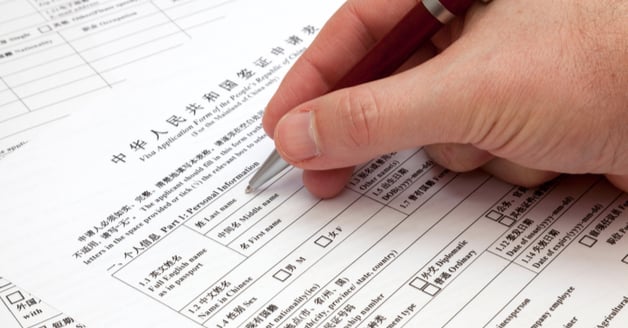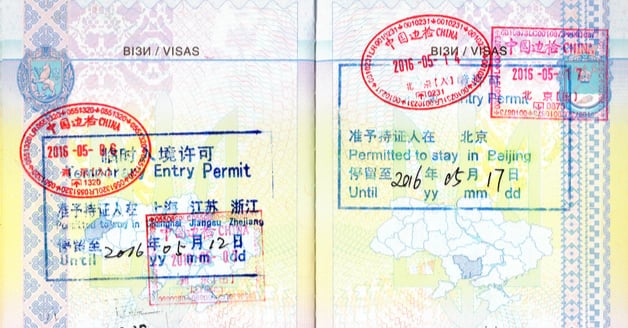
With its incredibly rich history and growing economy, it comes with no surprise that China is no longer an obscure destination to visit. Whilst the Chinese authorities have made great strides to make it easy for foreign visitors to come to China, be it to work, visit, or do business, the average visitor may still find it quite difficult to navigate the country’s visa rules and classes.
A lot of the information out there on visas in China is only available in Mandarin but fear not, in this blog, we clear up which Chinese visa and class you’ll need to enter the country for any number of reasons, all in English.
Which China Visa Type Do You Need to Apply For?
Before you make your way to your local Chinese embassy, you need to make sure that you are applying for the right type of visa and have all the necessary supporting documents to streamline your application process. There are different eligibilities and document requirements for each type of visa, we break it down below:
Private Family Visit or Dependent Visa (S1 / S2)
China Family Reunion Visa (Q1/Q2)
Resident Visa (D) & Talent Visa (R)
L Visa - China Tourist Visa

Probably the most common visa issued, the China tourist visa allows its holders to visit and freely travel around almost all parts of the country. In order to travel to Tibet or areas with civil unrest, visitors will need to obtain an additional travel permit.
For those looking to visit Hainan, the southern tropical island province, you may even be eligible to even visit the region visa-free as a part of a tour group! To find out if you qualify for visa-free travel to Hainan, you can check out this blog post.
Applying for a China tourist visa is easy – simply complete and gather all the necessary paperwork listed below, and send them to the Chinese embassy in your country with the application fee. You can apply via post, in person, or through an agent who will submit the application for you for an additional fee.
US citizens can visit the Embassy of the People's Republic of China in the United States of America’s website for more information on the application process. While the process is similar in other countries, your local Chinese embassy will have specific information for you.
Documents required to apply for a Tourist Visa (L):
- A passport that is valid for at least 6 months or more;
- A completed Visa Application Form of the People’s Republic of China;
- A coloured passport photo, affixed to the application form;
- Your itinerary - copies of your round-trip flight booking and hotel reservation, or an invitation letter from local friends that includes their address and other personal information;
- Release letter from work proving you're allowed to take the holiday that indicates when you will be returning to work, if requested;
- 6 months worth of bank statements, if requested;
- For visitors to Tibet, you can request for your travel permit from the Tourism Bureau of Tibet Autonomous Region (Tel: +86 891 6834313, Fax: +86 891 6834632). For those travelling with a tour group, your host will help arrange for your travel permit.
You will not need an invitation letter from a school or company to apply for a tourist visa.
G Visa - Transit Visa
For certain foreign nationals transiting through a China airport without an international stopover area, you may need a transit visa to pass through immigration and get to your connecting flight. You may be able to receive a 24-hour stay permit that is issued at the airport, but this is at the discretion of the immigration officer.
As the 'G' transit visa is not always necessary, you should check with your travel agent or tour operator if you will truly need one, or whether you can remain in the airport without it.
Nationals from the following 51 countries can enjoy a visa-free transit of 72-144 hours depending on the region:
Argentina, Austria, Australia, Belgium, Albania, Bosnia and Herzegovina, Brazil, Brunei, Bulgaria, Canada, Chile, Croatia, Cyprus, Czech Republic, Denmark, Estonia, Finland, France, Germany, Greece, Hungary, Iceland, Ireland, Italy, Japan, Latvia, Lithuania, Luxembourg, Macedonia, Malta, Mexico, Netherlands, New Zealand, Poland, Portugal, Qatar, Republic of Montenegro, Romania, Russia, Serbia, Singapore, Slovakia, Slovenia, South Korea, Spain, Sweden, Switzerland, United Arab Emirates, Ukraine, United Kingdom, United States.
Only visitors that transit through Harbin, Guilin, Changsha, Beijing, Tianjin, Shanghai, Xi'an, Chongqing, Shenyang, Dalian, Nanjing, Hangzhou, Shijiazhuang, Qinhuangdao, Chengdu, Wuhan, Xiamen, Qingdao, Kunming, or Guangdong Province can enjoy this benefit. During the visa-free transit, you are able to leave the airport to visit friends, landmarks, or even go shopping!
C Visa - Crew Visa
Airline crew members and their family, that transit through China can apply for a C visa. The application requirements for this is the same as the other visas, but you would also need to submit an invitation letter from a Chinese business, for instance, a shipping company, or a guarantee letter from your employer.
Documents required to apply for a Crew Visa (C):
- A passport that is valid for at least 6 months or more;
- A completed Visa Application Form of the People’s Republic of China;
- A coloured passport photo, affixed to the application form;
- An invitation or guarantee letter from your employer.
M Visa (Trade or Commerce) or F Visa (Cultural Exchange) - Business Visa

Both M and F visas were traditionally granted to people who are in China for business purposes but are not working for a local company.
Previously, business people would be granted the F visa most of the time, but it has now evolved to be for people on an exchange program for sports, health or culture, among others, or for those conducting scientific research. Today, the M visa, issued to foreigners visiting China for trade and commerce business, has become most common. If you're coming to China on business, expect to be granted an M visa.
Documents required to apply for a Business Visa (M/F):
- A passport that is valid for at least 6 months or more;
- A completed Visa Application Form of the People’s Republic of China;
- A coloured passport photo, affixed to the application form;
- Invitation letter from a Chinese company or trading partner (or institute for an F visa);
- Invitation to a Trade Fair;
- For owners or investors of a Chinese business: Business license to prove your role in the company;
- Your itinerary - copies of your round-trip flight booking and hotel reservation.
If applying for a multiple entry F or M visa, you may be required to provide photocopies of your prior China visas, to check your visa history. Applications for business visas can be made at your local Chinese embassy.
J1 Visa or J2 Visa - Journalist Visa
Journalists visiting China need to apply for a specialist visa that requires government approval. For a stay longer than 180 days, you will need to apply for a J1 visa, but for a shorter stay, a J2 visa will be sufficient.
A J1 visa is only valid for 30 days upon arrival. Employers would need to assist you in converting this into a temporary residence permit for the length of your contract in China or a maximum of 5 years.
Documents required to apply for a Journalist Visa (J1/J2):
The application for the specialist visa is similar to a business visa, but foreign journalists would need to provide additional information:
- A passport that is valid for at least 6 months or more;
- A completed Visa Application Form of the People’s Republic of China;
- A coloured passport photo, affixed to the application form;
- Notification letter from the Information Department of the Chinese Ministry of Foreign Affairs;
- Letter from your employer (a foreign news organisation), including your name that includes your itinerary with dates and times, interview locations, interview content, news organisation information and contact details.
X1 Visa or X2 Visa - Student Visa

Similar to journalist visas, there are 2 types of visas for students – the X1 visa for students looking to study in China for over 180 days, and the X2 for less than 180 days.
As with all long term stays that aren't business-related, you will need to convert your X1 visa into a residence permit within 30 days of arriving in China. Your school or university will be able to assist you with this once you are in the country.
Documents required to apply for a Student Visa (X1/X2):
- A passport that is valid for at least 6 months or more;
- A completed Visa Application Form of the People’s Republic of China;
- A coloured passport photo, affixed to the application form;
- The original and copy of your admission letter from your school or university.
For students applying for an X1 visa, you will also need to provide the original and copy of the JW201 or JW202 Foreign Student Visa Application Form.
Z Visa - China Work Visa
If you have been hired as an employee to work in China and spend more than 6 months in the country, you will need a Z visa. The visa will need to be converted into a residence permit within 30 days upon entry into China.
Documents required to apply for a China Work Visa (Z):
- A passport that is valid for at least 6 months or more;
- A completed Visa Application Form of the People’s Republic of China;
- A coloured passport photo, affixed to the application form;
- Certificate of No Criminal Conviction;
- Foreigner’s Work Permit application form;
- Job qualification certificate;
- Employment contract, employment certificate, or government authorisation letter;
- Authenticated copy of your educational certificate (or diploma) of your highest academic degree or relevant vocational qualification certificate;
- Certificate of No Criminal Conviction;
- Medical report.
For more information on work visas in China, you can read our blog post on its requirements here.
S1 Visa or S2 Visa - Private Family Visit Visa or Dependent Visa
For spouses, parents or other family members that want to visit their relative, who lives in China solely for work or educational purposes, you will need to apply for an S visa. Typically, the educational institute or employer will help organise S visas for their family at the same time as their visa application is made.
Similar to a Journalist Visa or a Student Visa, there are 2 types of S visas – S1 is for stays longer than 180 days, while S2 is for stays shorter than 180 days. S1 visas will need to be converted into a residence permit within 30 days of entering China.
Documents required to apply for a Dependent Visa (S1 / S2):
- A passport that is valid for at least 6 months or more;
- A completed Visa Application Form of the People’s Republic of China;
- A coloured passport photo, affixed to the application form;
- An invitation letter from your relative in China with both your relative’s and your details, your relationship, travel dates, accommodation address, proof of sufficient financial funds to cover your stay;
- Copy of your relative’s passport & residence permit;
- Original and copy of proof of relationship, e.g. marriage certificate, birth certificate, etc.
Q1 Visa or Q2 Visa - China Family Reunion Visa

The somewhat confusingly named 'Family Reunion' visa is for foreigners who are planning to come and visit their relative who is a Chinese citizen or has a permanent residence permit. Like the S visa, there are 2 types of Q visas – Q1 is for stays longer than 180 days, while Q2 is for stays shorter than 180 days. Q1 visas will need to be converted into a residence permit within 30 days of entering China.
Q2 visa holders will be given either single, double, or multiple entry privileges. Single-entry visa holders will need to obtain a new visa in order to re-enter the country, while multiple-entry visa holders are able to re-enter during the entire validity of their visa.
Documents required to apply for a China Family Reunion Visa (Q1 / Q2):
- A passport that is valid for at least 6 months or more;
- A completed Visa Application Form of the People’s Republic of China;
- A coloured passport photo, affixed to the application form;
- An invitation letter from your relative in China with both your relative’s and your details, your relationship, travel dates, accommodation address, proof of sufficient financial funds to cover your stay;
- Original and copy of proof of relationship, e.g. marriage certificate, birth certificate, etc.;
- Copy of your relative’s ID card.
D Visa - Resident Visa & R Visa - Talent Visa
Both the Resident Visa (D) and the Talent Visa (R) are not as common as the other visas.
If you are looking to become a permanent Chinese resident, you would apply for a D visa. However, as China traditionally doesn't take in many migrants due its already large population, this visa is often only granted under extraordinary circumstances, for example, to people who have brought great financial gain to China and have had good relationships with the relevant government departments for a period of more than 5 years.
The R visa, on the other hand, is for people who have a very unique talent or skill which is required in China, and is limited to a 180-day stay per entry. As most foreign workers usually apply for a Z visa and then a residence permit, applicants would need to check with their employer or the local authorities if an R visa may be a better option.
How to Convert Your China Visa to a Residence Permit?
A number of visas issued for people planning to stay in China for more than 180 days require conversion into a ‘temporary residence permit’, which is essentially a long-term visa, within 30 days from entering the country. While holders of other visas are not permitted to work in China, except for those with business visas, the holder of a residence permit is free to work legally in China. The holder is also able to freely enter and exit the country for the duration of the permit validity, usually up to 5 years.
In order to obtain your residence permit, you will need to go for an interview at your local Public Security Bureau (PSB) within 30 days of receiving your initial visa, and provide the following additional documents:
- Accommodation registration printout from your residence’s local police station which will need to be obtained within 24 hours of entering China;
- Physical examination report from the health check clinic where they will conduct a blood test (for STDs as well), eye test, dental check, chest x-ray, urine test, and an ECG;
- Copy of your employment contract in Chinese and English;
- Proof of your company’s eligibility to hire foreigners;
- An invitation letter from your employer;
- Your Foreign Expert Certificate – your company will obtain this for you after you provide them with your original BA or BSc degree. Non-graduates will need to provide proof of your work history of 2 years or more with references from employer(s).
Rarely do people applying for a temporary residence permit go through the process alone. Usually, the HR staff at your school or employer will assist you through every step. Most foreigners will only need to register at the local police station, go for the health check, and go for the interview at the PSB, and even then a local colleague will probably accompany you.
How Long Does It Take to Process Your China Residence Permit?
Processing your application can take around 2 weeks, so it's important to start the procedure for converting your visa to the residence permit ASAP!
Renewing Your Residence Permit
If your contract is extended, renewing a residence permit is simpler than applying for a new permit, provided that it is done before your old permit expires. You will probably have to have another interview with the PSB but won’t need to go for another health check, and will only need to submit your new contract and invitation letter.
How Many Times Can I Enter China With My Visa?

Typically you will be granted either a single-, double-, or multiple-entry visa. Each visa comes with its own restrictions:
- Single-entry visa: You may enter China once. If you leave, you will not be able to enter again using the same visa even if it has not expired.
- Double-entry visa: Similar to the single-entry visa, but with this, you can enter China twice. You will not be able to re-enter the country on the same visa once you leave for the second time even if it hasn’t expired.
- Multiple-entry visa: You can enter and exit China as many times as you like during the visa validity period. However, you may be bound by maximum stay periods of 30, 60, 90 or 180 days. Once you reach your maximum stay period you must exit the country, and re-enter if you wish to stay longer. For example, if you have a multiple-entry visa with a 30-day stay limit, then you must exit China every 30 days.
For single- or double-entry visas, if you use up your final exit while the visa is still valid, you will need to apply for a new visa again.
Need Help With Applying For Your Visa To China?
The application process for a China visa can be quite confusing with a number of document requirements. At Hongda, we can take the pain out of applying for China visas.
We've helped a number of foreigners apply for China visas since 2007 with our full service – from drafting your application form and getting the right kind of invitation letters to submitting your application. We can take care of all the red tape to ensure that you have a seamless application process.
To learn more about our services, please visit our Work Permit and Resident Permit page or contact us.
Applying for a China visa soon? Schedule a complimentary consultation with our experts below.






